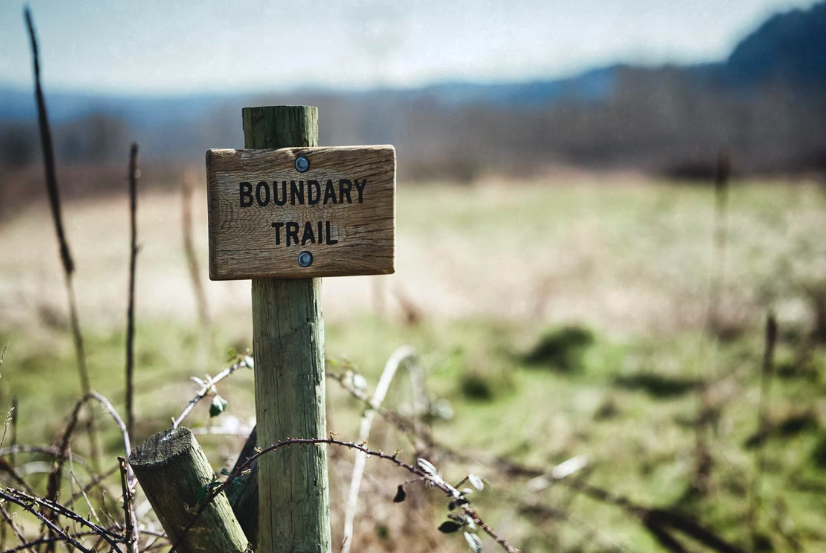We Can See Our Path More Clearly . . .
. . . with good boundaries.
What do you want to feel? With your partner or spouse? How do you want to feel at work? Regarding money issues? Do you want to experience more contentment? Do you want greater ease in relationships with your parents? Siblings? With your children? Friends? Colleagues? Do you want to have more time? Do you want to feel better about yourself? To know who you are and be that person wherever you go, not changing like a chameleon, or reverting to past versions of yourself when you’re triggered?

When we know what we want to feel, it is easier to be motivated to make it happen!
Boundaries serve us like windows through which we see the path we want to be on. They help us get onto that path, going towards what we want to feel and who we want to be. Then, by maintaining our boundaries, we stay on the path.
Good boundaries keep us focused upon what we want and what we don’t want. We draw the brave perimeters of boundaries ourselves. Enacting clear boundaries helps us to attain what we want to feel in every aspect of our lives! It becomes more and more evident over time that we can only distinguish ourselves by who we are and who we are unfolding to become, not by our circumstances or how others want us to be. Boundaries help us to see these truths through defined windows.
Awareness of what we want to feel keeps us heart-focused, motivating us to do the hard work of teasing out what our boundaries need to be then handling the discomfort of stepping onto the assertive paths that will lead us there. It is almost always uncomfortable to set boundaries, but the reward is ultimately serenity. For example, if you want to feel happier and you commit to greater happiness, you begin to notice the thoughts and behaviors that lead you away from happiness into drama, anxiety, or negative thinking. You become aware of the discomfort you’re experiencing and allow it, instead of attempting to fix it or avoid it with a substance or any compulsive behavior. Knowing you want to feel some peace, you move towards the golden light rays of peace, then you enjoy the warmth of that peace that you find.
When we can “stay” with our discomfort temporarily, being in our bodies with it, we actually feel better more quickly. It’s transformative. It may seem paradoxical that by thoroughly allowing our pain as it arises we can experience more of the happiness we want to feel, but it’s true.

Try this. Think about a boundary you need to set but are reluctant to.
Feel your discomfort, saturating yourself with the unpleasantness of it. Exhale out with a big outbreath, pause, then inhale.
Pause. Repeat: let out a huge exhale, pause, then inhale, pause, and release that breath.
Now allow yourself to glance outside, into nature if you can, and notice anything pleasant you can rest your gaze upon. Perhaps it’s the green leaves of a tree, or a patch of blue sky. Allow yourself to cherish the beauty of what you’re seeing, as if you’ve just been released from prison, with grateful eyes. Breathing it into your heart, feel the loveliness through your skin. Notice that you can hold your discomfort, then pendulate over to observing something that’s alluring and attractive. What do you feel? You may feel more alive, vibrant, or expansive, able to allow a twinge of gladness while at the same time accepting the pain that still lingers. This is our human capacity to embody paradox. It’s a key factor in being able to handle our discomfort or guilt while exerting our boundaries. Just as we did with the pause in our breath, we learn to hold space within ourselves for any distress. It’s tough, but we can deal with it temporarily. Remembering it will pass, we will soon be able to feel some ease again.
Many of us have habitually avoided feeling our pain on a deeply cellular level. When we learn we can stay with it, brave and vulnerably open, there’s less emotional stiffness. We become emotionally agile. Disidentifying with our minds, giving less attention to our thoughts, we focus more upon our raw and hurting hearts, with tender compassion. We can pay better attention to what we’re doing, to our actions, instead of unconsciously reacting. We become more flexible and can leap out of our heads into our hearts for true relief. Remembering what we want to feel is a wonderfully powerful motivational force, and re-grounding in our hearts and bodies gets us there. Facilitating this consistent, friendly process of transforming our thinking and tending to our emotions is crucial in maintaining our boundaries.

Developing an unconditional friendship with ourselves, we guard our happiness and exert better boundaries. This protects us from drama, leading us back into contentment! Observing how we think and act with fierce honesty is a first step into consciously choosing to console ourselves empathetically, then dropping thoughts and actions that don’t serve us on our paths of happiness. Mindful, heart-focused effort helps with the challenge and complexity of this process. Thoughts can be disruptive, yet the wisdom of the heart is never disruptive when we learn how to listen to it.
Heart-focused and boundaried, knowing what we want to feel while protecting our borders, we wake up with greater clarity about how our days need to go, what we need to say, and where to be silent or wait. Remembering how we want to feel, we go to sleep with less regret about what we did or didn’t do, honoring and cementing our boundaries. I don’t let circumstances or other people decide how my life will go, & you don’t need to either. Setting boundaries is tough but doing so gives us more control.
Boundaries clarify both our vision and the paths we need to consistently walk upon.
Do you want to make a dream come true? Create changes for the better? To get to the roots of feeling fearful, anxious, depressed? To heal? See what you want to feel, specifically. Prioritize those feelings. Make them a reality by diligently cultivating emotional agility and setting boundaries. Can you decisively get on the path towards that reality?
